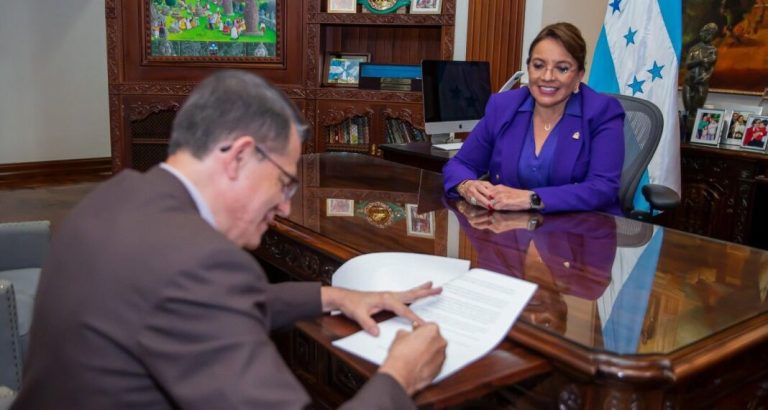
Honduras legalizes emergency contraception
25 August, 2023‘We did it’: after 13 years Honduras legalizes emergency contraception pills without exceptions
Following more than 13 years of prohibition and a year of demands by feminist activists, Honduras’ first female president, Xiomara Castro, legalized emergency contraception pills without exceptions. This piece was first published by Reportar sin miedo here.
Tegucigalpa, Honduras. In an executive order coinciding with the commemoration of International Women’s Day, 8 March 2023, Honduran President Xiomara Castro approved the sale of the emergency contraception pill (known as ECP in English and PAE in Spanish), putting an end to more than 13 years of prohibition imposed by a de facto government and upheld by three nationalist governments.
‘Today on 8M we commemorate the historical struggle of women by signing with the Secretary (of Health) José Manuel Matheu an Executive Agreement for free use and commercialization of the PAE. The World Health Organization has determined that it is part of women’s reproductive rights and is not abortive,’ posted Castro on her official Twitter account.
‘We made it’ were the first words of Jinna Rosales, a young feminist, social worker, and director of the organization Acción Joven, as tears came to her eyes after more than 10 years of struggle.
Jinna is one of the women who have led the process towards the PAE’s legalization. Along with her team, she coordinated political advocacy through strategic meetings and media campaigns on the social media accounts of Let’s Talk About What It Is (@hablemosloquees) and other platforms.
Earlier in the day, thousands of young people took to the streets of Tegucigalpa, San Pedro Sula, El Progreso, Santa Bárbara, La Ceiba, Choluteca, Santa Rosa de Copán, Choloma, Villanueva, and other cities demanding a ‘PAE libre para todas, todos y todes.’
Emergency contraceptive pills have been prohibited in Honduras since 2009. One of the first decrees of the de facto government of Roberto Micheletti in 2009, following a military coup, was to repeal the ministerial agreement allowing the unrestricted sale of ECPs in the country.
In 2022, Health Secretary José Matheu approved the use of the pills in the case of victims of sexual violence.
The Strategic Group for the legalization of the pill (GPAE) criticized Matheu’s measure, saying it excluded other population groups.
In an interview for the British media BBC, Matheu informed that the Health Secretariat was not going to promote the PAE as contraception for ‘sexual debauchery’.
‘We are going to use the morning-after pill only for rape victims. Those who have irresponsible sex should assume the consequences,’ Matheu added.
The minister’s statement alarmed women’s rights organizations in Honduras.
The fight to end the ban on ECP began in 2014. That year, feminists formed the GE-PAE Strategic Group. In doing so, they pushed for the elimination of the ministerial agreement that banned PAE.
The organizations that drove this tremendous achievement are Acción Joven, the Centro de Derecho de las Mujeres, Ecuménicas por el Derecho a Decidir, Movimiento Yo no Quiero ser Violada, We Lead, Fundación Llaves and Centro de Estudios de la Mujer.
‘We will have FREE PAE for all! Finally! After almost 14 years’, expressed Ligia Destephen, coordinator of the We Lead program that includes 14 organizations in Honduras that fight for the rights of young women.
Thanks Xiomara Castro and José Matheu. We celebrate this important step for women’s sexual and reproductive rights!’, tweeted Alice Shackelford, the UN Resident Coordinator in Honduras.
Follow Sounds and Colours: Facebook / Twitter / Instagram / Mixcloud / Soundcloud / Bandcamp
Subscribe to the Sounds and Colours Newsletter for regular updates, news and competitions bringing the best of Latin American culture direct to your Inbox.

